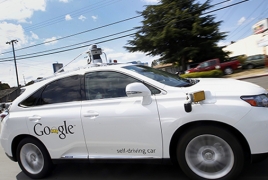
Google has set up its own car company. The tech giant has flirted with major car firms as it explores driverless cars but has also quietly set up its own auto company, the Guardian reports, citing the documents it obtained.
Google Auto LLC is headed by Chris Urmson, project lead for Google’s self-driving cars. Urmson has been on a charm offensive with the world’s biggest automobile manufacturers. At the North American International Auto Show in January, Urmson announced talks with General Motors, Ford, Toyota, Daimler and Volkswagen.
In March, he told USA Today: “Making cars is really hard, and the car companies are quite good at it. So, in my mind, the solution is to find a partnership.”
Documents obtained by the Guardian under a Public Records Act request in California show that Google Auto was formed as a limited liability company in late 2011. Initially, Google used it to modify and test the fleet of driverless Lexus SUVs that succeeded the company’s first self-driving Prius saloons. Google Auto is named as the manufacturer of all 23 autonomous Lexus cars registered with California’s department of motor vehicles, including all the vehicles involved in a recent spate of minor accidents in and around Google’s home town of Mountain View.
It was Google Auto LLC that applied for the international vehicle identification number (VIN) codes to identify each new self-driving car, just like any other production vehicle. Google Auto also liaised with America’s National Highway Traffic Safety Administration (NHTSA) and organised emissions testing in California. To avoid onerous safety requirements and crash tests, Google Auto’s cars would be lightweight low speed vehicles (LSVs), capable of a top speed of only 25mph.
Paperwork filed by Google Auto with the NHTSA, and seen by the Guardian, indicates that the cars are rear-wheel drive in design, with each wheel having its own braking system. The cars are powered by a modest 20-30kW electric motor from a lithium ion battery. All the cars built so far have been assembled on the outskirts of Detroit, Michigan, by Google’s manufacturing partner, the engineering firm Roush.
In correspondence with Mark Rosekind, administrator of the NHTSA, Urmson insisted, “Google Auto LLC has not offered any of its LSVs for sale, and it does not plan to do so.” This is not surprising. With Google so far ahead of other car makers in developing self-driving systems, it would be unlikely to market experimental vehicles packed with cutting-edge technology.
However, that does not rule out Google Auto from selling driverless cars direct to the public later on. In fact, says Sebastian Thrun, the computer scientist and engineer who launched Google’s self-driving car project: “The ambition for Google is always to go all the way [from research] to product.”

